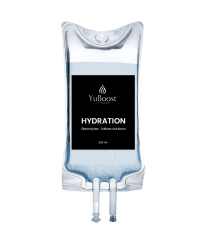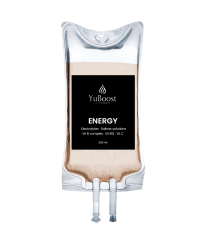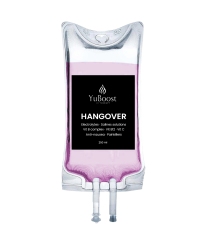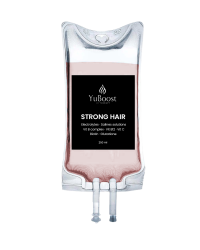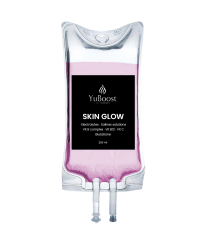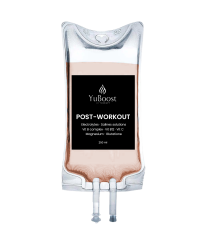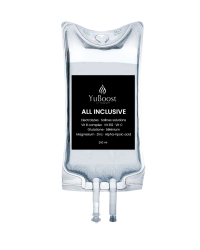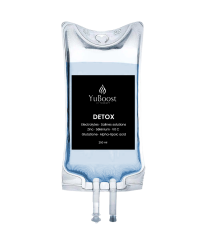The efficacy of intravenous vitamin infusions
Key Benefits and Mechanisms of Action of Vitamin Infusions
Vitamin infusions have become a popular approach to optimizing health and managing a variety of medical conditions. By bypassing the digestive system, this method allows direct and rapid absorption of nutrients and vitamins into the bloodstream, offering maximum biological availability. Although widely adopted in the field of preventive, functional and anti-aging medicine, scientific evidence concerning the efficacy of these infusions still remains a matter of debate. This article aims to review the latest clinical studies on the efficacy of vitamin infusions and their potential applications.


Enhanced Nutrient Absorption with Vitamin Infusions
An intravenous infusion delivers high concentrations of nutrients directly into the bloodstream, reaching plasma levels impossible to achieve orally. This is particularly relevant for substances such as vitamin C, B-complex, NAD+ and glutathione, which play crucial roles in energy metabolism, immune support and the fight against oxidative stress.
Clinical benefits
Optimized absorption:
Rapid effects:
Customizable dose:
Clinical Efficacy of High-Dose Vitamin C Infusions in Serious Illnesses
Vitamin C infusions are widely studied in the treatment of acute and chronic illnesses. A recent meta-analysis evaluated the efficacy of intravenous vitamin C in patients with sepsis and septic shock. This study showed a significant improvement in organ dysfunction scores (SOFA score), however without a reduction in mortality, suggesting that the beneficial effect of vitamin C may be more relevant for clinical stabilization than for complete cure (SpringerOpen).
In oncology, clinical trials have examined the impact of high-dose intravenous vitamin C on patients with advanced cancers. Studies have shown that the therapy is generally well tolerated, with few serious side effects. However, although no significant anti-tumor responses were observed in monotherapy studies, some exceptional cases reported complete tumor regression and prolonged survival in patients with advanced cancers (BioMed Central).


How Vitamin Infusions Improve Quality of Life and Well-Being
Safety and Tolerance of Vitamin Infusions in Medical Practice
List of studies about oral and parental administration
| Reference | Study Design | Group | Treatment | No. of Participants | Main Findings |
|---|---|---|---|---|---|
| Castro-Marrero et al., 2015 [27] | Randomized, double-blind, placebo-controlled trial | Chronic fatigue syndrome (CFS) patients | Oral CoQ10 (200 mg/day) + NADH (20 mg/day) for 8 weeks | 73 | Significant improvement of fatigue showing a reduction in fatigue impact scale total score (p < 0.05) |
| Castro-Marrero et al., 2021 [28] | Prospective, randomized, double-blind, placebo-controlled trial | Individuals with Myalgic encephalomyelitis/chronic fatigue syndrome (ME/CFS) | Oral CoQ10 (200 mg/day) + NADH (20 mg/day) for 12 weeks | 207 | Significant reduction in cognitive fatigue perception and overall fatigue impact scale (FIS-40) score (p < 0.001 and p = 0.022) |
| Castro-Marrero et al., 2016 [29] | Randomized, controlled, double-blind trial | Chronic fatigue syndrome (CFS) patients | 50 mg of CoQ10 and 5 mg of NADH twice daily for 8 weeks | 80 | Significant reduction in perception of fatigue through all follow-up visits in active group versus placebo (p = 0.03) |
| Iwase et al., 2016 [22] | Multi-institutional, randomized, exploratory trial | Breast cancer patients | Inner Power (IP) oral supplement containing branched-chain amino acids (2500 mg), coenzyme Q10 (30 mg), and L-carnitine (50 mg), once daily for 21 days | 57 | Changes in the worst level of fatigue, global fatigue score (GFS), and current feeling of fatigue were significantly different between the intervention and control groups |
| Mizuno et al., 2008 [30] | Double-blinded, placebo-controlled, three crossover design | Healthy volunteers | Oral coenzyme Q10 (100 or 300 mg/d) or placebo administration for 8 days | 17 | Significant alleviation of subjective fatigue sensation measured on a visual analogue scale in the 300-mg coenzyme Q10–administered group |
| Mizuno et al., 2020 [23] | Double-blind, placebo-controlled study | Healthy volunteers | Ubiquinol-10 (100 or 150 mg/d) or placebo administration for 12 weeks | 104 | Improvements in subjective levels of fatigue sensation and sleepiness after cognitive tasks |
| Gokbel et al., 2010 [31] | Randomized, double-blind, crossover study | Healthy and sedentary men | 100 mg/day CoQ10 for two 8-week periods | 15 | Mean power increased only with CoQ10 supplementation during the fifth Wingate test (WT5) |
| Sanoobar et al., 2016 [32] | Randomized, double-blinded, placebo-controlled trial | Multiple sclerosis patients | 500 mg/day CoQ10 for 12 weeks | 48 | Significant decrease of fatigue severity scale (FSS) in CoQ10 group during the intervention (p = 0.001) |
| Cordero et al., 2013 [16] | Randomized, double-blind, placebo-controlled trial | Fibromyalgia (FM) patients | CoQ10 supplementation (300 mg/day) for 40 days | 20 | Prominent reduction in pain (p < 0.001), fatigue, and morning tiredness (p < 0.01) |
| Reference | Study Design | Group | Treatment | No. of Participants | Main Findings |
|---|---|---|---|---|---|
| Suh et al., 2012 [79] | Randomized, double-blind, controlled clinical trial | Healthy volunteers | Single intravenous treatment of either vitamin C (10 g) or normal saline | 141 | Fatigue scores decreased significantly (p = 0.004) in the vitamin C group after two hours and remained lower for one day |
| Takahashi et al., 2012 [76] | Multicentre prospective observational study | Cancer patients | Up to 50 g IVC twice a week, for 4 weeks + oral vitamin C 2–4 g/day | 60 | Significant improvements in fatigue scores at 2 weeks of IVC therapy (p < 0.01) |
| Yeom et al., 2007 [77] | Prospective Observational Study | Cancer patients | 10 g IVC administered twice with a 3-day interval + oral vitamin C 4 g/day for a week | 39 | Patients reported significantly lower scores for fatigue (p < 0.05) |
| Vollbracht et al., 2011 [78] | Epidemiological, multicentre cohort study with parallel groups | Cancer patients | i.v. vitamin C (Pascorbin® 7.5 g) additional to standard tumor therapy for at least 4 weeks | 125 | Significant reduction in fatigue symptoms |
| Ou et al., 2020 [75] | Single-centre, phase II, randomized clinical trial | Non-Small-Cell Lung Cancer (NSCLC) patients | 1 g/kg/day IVC with modulated electrohyperthermia (mEHT) plus best supportive care (BSC), three times a week for 25 treatments | 97 | Significant reduction in fatigue symptoms (QLQ-C30) |
| Vollbracht et al., 2018 [80] | Multicentre prospective observational study | Patients with allergy-related respiratory or cutaneous indications | i.v. vitamin C (Pascorbin® 7.5 g/50 mL) in 100 mL NaCl 0.9% | 71 | Significant reduction in fatigue symptoms |
| Jeon et al., 2016 [81] | Single-centre, randomized, double-blind, controlled clinical trial | Patients undergoing laparoscopic colectomy | IVC 50 mg/kg body weight or placebo; single application after induction of anesthesia | 97 | No significant differences in fatigue score 2, 6, and 24 hours post-operation |
| Aziz et al., 2021 [82] | Prospective cohort study | Patients with liver cirrhosis due to chronic hepatitis C | Vitamin D3 (200,000 IU IM single dose) | 50 | Fatigue severity scale (FSS) and fatigue impact scale (FIS) scores improved significantly after administration of vitamin D3 |
| Brass et al., 2001 [83] | Placebo-controlled, double-blinded, randomized study | Patients with end-stage renal disease (ESRD) | Intravenous L-carnitine 10, 20, and 40 mg/kg or placebo at the conclusion of each thrice-weekly dialysis session for 24 weeks | 150 | Significant improvement in the fatigue domain of the Kidney Disease Questionnaire (KDQ) |
| Zhang et al., 2014 [18] | Randomized, single-blind, placebo-controlled pilot study | Metabolic syndrome (MetS) patients | 4 g/day of intravenous L-carnitine for 7 days; control group received saline | 15 | Significant reduction in physical fatigue (p < 0.001) and fatigue severity (p < 0.001) |
| Massey et al., 2007 [84] | Open-label clinical trial | Therapy-resistant Fibromyalgia (FM) patients | Intravenous nutrient therapy (IVNT) once per week for 8 weeks | 7 | 60% reduction in pain (p = 0.005) and 80% decrease in fatigue (p = 0.005) |
| Costantini et al., 2013 [17] | Pilot study | Multiple sclerosis patients | High-dose thiamine 600–1500 mg/day orally or 100 mg/mL once a week parenterally for 20 days | 15 | Statistically significant relief of fatigue symptoms |
Conclusions on the efficacy of vitamin infusions
Discover our other IV drips
High Dose Vitamin C

Iron



